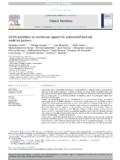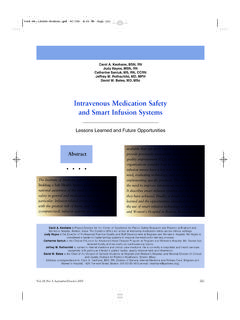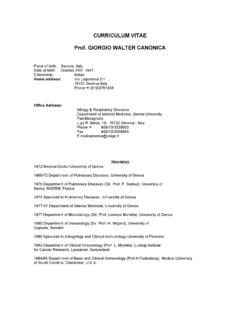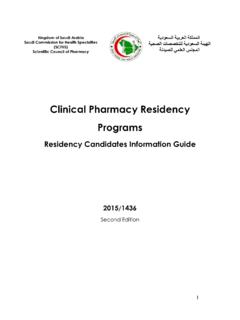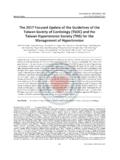Transcription of The University of Jordan Faculty: Pharmacy …
1 1/ 5 The University of Jordan faculty : Pharmacy department : biopharmaceutics and clinical Pharmacy Program: Academic Year/ Semester 2013-2014 Internal medicine clerkship-oncology supportive care (123601) Credit hours 7 hr Level 6th year pharmD Pre-requisite Pharmacotherapy courses Coordinator/ Lecturer PhD personnel Ola Aldiab Amal Akour Office number Please fill 234 Office phone Please fill 23344 Course website E-mail Place JUH Office hours Day/Time Sunday Monday Tuesday Wednesday Thursday 2-3 pm 2-3 pm Dr. Amal 1-2 pm 1-2 pm Course Description This hospital training is directed toward training the students to use the theoretical and basic principles of pharmacology, therapeutic and clinical courses in dealing with real cases to identify and resolve different treatment related problems in oncology, regarding supportive care and chemotherapeutic agents.
2 Learning Objectives The central goal of the oncology-clerkship course is two-fold. First, to provide students with a solid grounding in the basic concepts and scientific underpinnings of supportive care in oncology unit. Second, to provide students with a comprehensive introduction pharmaceutical care concepts and uses of the major classes of clinically important drugs currently used in medical practice. 1/ 5 By the end of this clerkship, the student will have appreciation of the application of modern concepts of pharmacotherapy and will be prepared for future career as a clinical pharmacist. Intended Learning Outcomes (ILOs): Successful completion of the course should lead to the following outcomes: A. Knowledge and Understanding: Student is expected to: A1- to gain knowledge about the most current guidelines regarding the supportive care of patients who are receiving chemotherapy (pain management, cancer-related anemia, etc).
3 A2- to gain knowledge of the most common and adverse effects of cancer chemotherapy encountered in practice B. Intellectual Analytical and Cognitive Skills: Student is expected to: B1- be able to identify the most significant drug- drug interactions among patient s medications and know how to monitor and manage such interactions B2- be able to identify TRPs in patients who are receiving cancer chemotherapy and to construct optimal care plan for the patient. C. Subject-Specific Skills: Student is expected to: C1-demonstrate the ability to determine if the patient achieved the desired outcomes and to determine the appropriate frequency for follow up evaluation. C2-To demonstrate the ability of students to provide appropriate patient counseling. D. Transferable Key Skills: Students is expected to: D1- demonstrate the ability to search for specific guidelines and use of EBM for controversial area.
4 D2- learn problem solving skills and analysis when guidelines are unavailable or research in certain area are lacking. D3- be able communicate with health care providers and their ability to provide a clear recommendations to them. 1/ 5 Teaching Methodology and regulations In each training course, the students will be divided into groups. Each group will undergo training in the hospital for two weeks -daily (Sunday-Thursday), from ( AM-2:00 PM). 1. Students must attend a minimum of 2 teaching rounds per week, with medicine students. 2. Students will be responsible for one full case 1st week (follow up until DISCHARGE), then two cases per week. 3. Students must conduct full patient interview and counseling for full case, otherwise case will not be accounted for, and student must submit another case or receive a "zero" for that certain case.
5 4. Students must pick their main full case within the first 2 days of the week (Sunday or Monday), By Tuesday, they must have read about the disease and medications and prepared primary PCP. Students will be asked about their cases and input on their cases during the week. 5. Students must attend daily morning report and weekly clinical Pharmacy round and be prepared for any questions the preceptor may have regarding their case as well as cases that other members of their group have. 6. Students will have a daily case discussion with their supervisor and must be fully prepared. Anything regarding disease, pharmacotherapy or pharmacology of drugs may be asked. 7. Students will be assigned a topic by their preceptor in whom they must prepare a brief presentation. There will be one presentation per student per rotation.
6 Topic will be assigned by preceptor. 8. Attendance will be taken daily, and a tardiness of 15 minutes or more will be considered an absence. 9. If a student is caught cheating or filling manual with false data then he/she will receive a zero in the area they are caught cheating in. ** At the beginning of each week (Sunday) except the first week, students must submit full cases. Marks will be deducted for late submission. 1/ 5 Evaluation Evaluation Point % Date Discussion 15 During the two weeks rotation( daily basis) Manuals 15 At the beginning of each week Assignments/quizzes and presentation 15 During the two weeks rotation ( daily basis) PhD discussion 10 Arranged with PhD holder Final Exam 50 Main Reference/s: 1-NCCN guidelines #q=nccn+guidelines 2-Uptodate 3-Drug Information handbook-oncology Other useful references: 1.
7 Pharmacotherapy: A Pathophysiological Approach, ed. DiPiro et al, 8th edition, 2011. 2. Koda-Kimble and Young's Applied Therapeutics: The clinical Use of Drugs, 10th edition, 2013. 3. Disease management guidelines (specified as neccessary) 1/ 5 Course Contents Content Reference Week ILO/s Chemotherapy induced nausea and vomiting NCCN Throughout the rotation students should be familiar with the following: Definition Risk factors Classification Anti-emesis medication (Exact mechanism of action, major SE Drug-Drug interaction). Proper prophylaxis Management of nausea and vomiting in case of prophylaxis failure Patient education. Pain management NCCN Throughout the rotation students should be familiar with the following: Causes Classification of severity Opioid (mechanism of action, major SE and the mechanism of SE|) Management of pain in cancerous patient Management of pain with adjuvant agents.
8 Patient education about HTN. Anemia related to chemotherapy NCCN Throughout the rotation students should be familiar with the following: Symptoms and 1/ 5 Causes of anemia RBC transfusion indication, advantage and SE and target level Management with Erythropoietin and SE Patient education. Infection related to cancer NCCN Throughout the rotation students should be familiar with the following: Most common suspected infection Risk factor for infection. Different antibiotic, antifungal and antiviral medications (mechanism of action, major SE and the mechanism of SE|) Management of neutropenic fever When to use prophylaxis for different type of cancer Patient education. Myeloid growth factor NCCN Throughout the rotation students should be familiar with the following: definition different type of colony stimulating factor (mechanism of action, major SE use of CSF as prophylaxis Patient education about CSF.)
9 VTE in cancer patient NCCN Throughout the rotation students should be familiar with the following: Causes 1/ 5 Risk factor Anticoagulants (mechanism of action, major SE Management of HIT When to use of VTE prophylaxis . Treatment of VTE and PE Neutropenic fever treatment IDSA 2010 Throughout the rotation students should be familiar with the following: definition treatment of choice, use of CSF as treatment Patient education about NF. Treatment of Afebrile neutropenia Monitoring parameters Hypercalcemia in malignancy Uptodate Throughout the rotation students should be familiar with the following: Causes Classification of severity Different medications to treat hypercalcemia (mechanism of action, major SE Management of hypercalcemia with adjuvant agents. Patient education about hypercalcemia.))
10 Tumor lysis syndrome TLS Journal of oncology Throughout the rotation students should be familiar with the following: Definition Causes 1/ 5 Classification of severity Agents use as propylaxis (mechanism of action, major SE Management of TLS. Patient education about TLS. Oral and enterotoxicity of chemotherapy Uptodate Throughout the rotation students should be familiar with the following: Common SE of chemotherapy Causes and pathophysiology Classification of severity ( grading system of SE) Agents use as propylaxis Management of toxicity specific agent. Patient education. Xerestomia/ anorexia mucosities/oral candiasis Uptodate Throughout the rotation General toxicity of chemotherapy agents -Platinium agents ( ) -Anthracyclines -Vina alkaloid -Methotrexate, Etoposide, Ara-C, Ifosphamide, Docetaxel, Infliximab Uptodate/Dipiro DI handbook-oncology Throughout the rotation Common chemotherapy regimen used for cancer -DI-Handbook-oncology -Huntsman Cancer Learning Center -BC agency Throughout the rotation students should be familiar with the most common protocols and toxicity 1/ 5)




